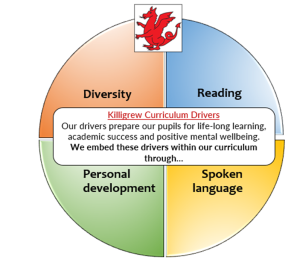At Killigrew Primary and Nursery School we have four key drivers which are represented in the curriculum we teach our pupils.
- Spoken Language
- Diversity
- Reading
- Personal Development
 We use these drivers to prepare our pupils for life-long learning, academic success, and positive mental wellbeing.
We use these drivers to prepare our pupils for life-long learning, academic success, and positive mental wellbeing.
These drivers underpin learning in all aspects of the curriculum and enrich our teaching. The drivers are personal to our school and reflect what we know about our pupils on entry to the school, how they learn throughout their school journey and the social and educational priorities of our local area and community. Through embedding these in our curriculum offer, we know that our pupils are well equipped with the knowledge, skills, and aspiration they need to succeed throughout their lifetime.
Spoken Language
In all our curriculum teaching, we focus on spoken language acquisition. We prioritised this driver because we noticed that the children entering our Early Years setting had less confidence when communicating with each other and talking about language.
We also know that the ability to communicate effectively is a skill that is important for life-long learning. Ultimately, if our pupils have effective communication skills, they can confidently articulate their feelings and beliefs across all curriculum areas.
In addition, it is crucially important that our children understand the link between the spoken word and words on paper. Therefore, we support them to focus for longer and talk with confidence about what they have read or heard. We ensure that all adults model targeted and purposeful talk and enhance our children’s breadth of vocabulary and curiosity about language. To promote effective talk within lessons, our teachers plan and teach modelled responses and use age-appropriate speaking frames.
In maths, a focus on spoken language and mathematical reasoning supports our pupils to express themselves clearly, talk about a subject with assurance, and use the correct mathematical language and vocabulary when reasoning.
Diversity
Our second driver is focussed around promoting our pupils understanding and appreciation of diversity. This is particularly significant for our school because our school population has a lower-than-average proportion of pupils from minority ethnic groups. Therefore, it is especially important that our children celebrate the achievements and contributions that people from all faiths, races and genders have made, or are making, to our wonderfully diverse world.
In our curriculum, we study a wide range of artists, from different cultures and we ensure that that the voice and contributions of writers from different cultures and backgrounds (including BAME groups) are fully represented. We make links between different subject areas by, for example, basing some of our visual literacy units around interesting paintings, with diverse cultural influences. Our history provision includes a Black history focus at least once a term as we want to ensure that the contribution of Black people, both now and in the past, is recognised and celebrated.
By linking our RE curriculum to the consideration of ‘ultimate questions,’ we guide our pupils to consider community and school focused questions, help them to appreciate diverse viewpoints and investigate moral and ethical issues. We constantly make the link between our Killigrew learning powers and the positive values of the wider world.
Reading
Our third driver focuses heavily on supporting and generating a love of reading. This starts with our commitment to ensure that early reading is prioritised so that every child can pick up, read, and enjoy an age-appropriate text. We know that early difficulties with reading can mean that a child becomes a disengaged reader, and that this can be prevented by high quality phonics teaching and early intervention.
We also know that, in today’s modern world, our children are more used to picking up and reading snapshots of information on social media and thus may be losing the stamina to read at length and for pleasure.
We also know that the language and vocabulary the children may be exposed to online is often less developed than they might read in a book, so we have a responsibility to ensure that they are taught ambitious words within our curriculum and the reading material we provide.
Therefore, our guided reading planning identifies key reading objectives and indicates age appropriate (but challenging) reading stimulus materials. Through our text choice, we enable children to critically interrogate texts and talk knowledgeably about authorial intent. In addition, our planning for foundation subjects indicates appropriate reading materials to support and enhance subject teaching.
We have two inviting libraries which are well-stocked with well-loved titles. Through the generosity of our parent body, we keep our libraries up to date with exciting new releases (as selected and listed in our wish list). We are working hard to ensure that the books on offer represent different cultures, are gender neutral, inclusive and represent a range of family dynamics.
All our pupils enjoy their weekly library slots, and the opportunity to browse the books in the classroom book corners. Our Key Stage 2 pupils use online reading logs to record the reading they do outside school, and this is celebrated in a weekly assembly with a ‘Star Reader’ award.
Personal Development
We prioritise the personal development of all pupils as we know that we are responsible for developing responsible and respectful children, who understand how their beliefs, values and actions can impact on the world around them, both now and in the future. We work hard to support children to develop their character and personal wellbeing so that they can flourish and succeed in their education and in society.
We know that it is important that all pupils have equal opportunity regardless of their socio-economic background, ethnicity or gender and we provide an inclusive environment for pupils to play and learn.
We promote pupils’ personal development through helping them become independent when they are learning and supporting them to reflect on their work and how they are feeling. We help them to communicate their views and feelings confidently in different situations and provide quality curriculum enrichment that enhances social, moral, spiritual & cultural development.
Our new learning powers, that we created using input from the whole school community, specifically reference the values that we know are important for life-long learning, academic success and positive mental wellbeing.
